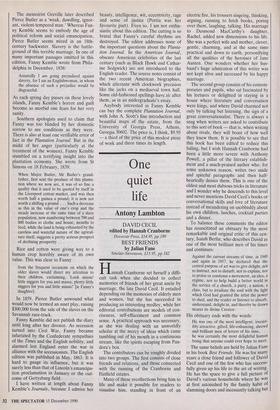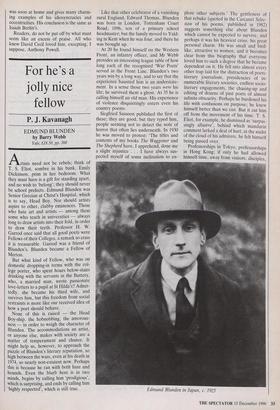One quiet life
Antony Lambton
DAVID CECIL BEST FRIENDS Hannah Cranborne set herself a diffi- cult task when she decided to collect memories of friends of her great uncle by marriage, the late David Cecil. It entailed depending on the memories of elderly men and women, but she has succeeded in producing an interesting medley, while her editorial contributions are models of con- ciseness, self-effacement and common sense. A practical approach was necessary, as she was dealing with an unworldly scholar at the mercy of ideas which came tumbling out of his mouth in a continuous stream, like the spirits escaping from Pan- dora's box.
The contributors can be roughly divided into two groups. The first consists of close friends and relations, and those connected with the running of the Cranborne and Hatfield estates.
Many of these recollections bring him to life and make it possible for readers to visualise him, standing in front of an
electric fire, his trousers singeing, thinking, arguing, running to fetch books, poring over them, laughing, talking. His marriage to Desmond MacCarthy's daughter, Rachel, added new dimensions to his life. She was a perfect wife and mother, clever, gentle, charming, and at the same time practical and down to earth, personifying all the qualities of the heroines of Jane Austen. One wonders whether her hus- band's huge admiration of this writer was not kept alive and increased by his happy marriage.
The second group consists of his contem- poraries and pupils, who sat fascinated by his lectures or delighted in staying in a house where literature and conversation were kings, and where David charmed not only by talking but listening, the sign of a great conversationalist. There is always a snag when writers are asked to contribute to this sort of book — that is, when writing about rivals, they will boast of how well they knew them. It is possible to see that this book has been edited to reduce this failing, but I wish Hannah Cranborne had been a little more severe with Anthony Powell, a pillar of the literary establish- ment and a much-praised author who, for some unknown reason, writes two snide and spiteful paragraphs and then half- heartedly denies them. This is one of the oldest and most dubious tricks in literature and I wonder why he descends to this level and never mentions David Cecil's books or conversational skills and love of literature instead of meandering on snobbishly about his own children, lunches, cocktail parties and a dinner.
To balance these comments the editor has resuscitated an obituary by the most remarkable and original critic of this cen- tury, Isaiah Berlin, who describes David as one of the most brilliant men of his times and continues:
Against the current streams of time, in 1949 and again in 1957, he declared that the central purpose of art was to give delight, not to instruct, not to disturb, nor to explain, nor to praise or condemn a movement, an idea, a regime, nor to help build a better world in the service of a church, a party, a nation, a class, but to irradiate the soul with the light which God had granted the artist the power to shed, and the reader or listener to absorb. understand, delight in, and thereby be drawn nearer its divine Creator.
His obituary ends with the words:
He was one of the most intelligent, irresist- ibly attractive, gifted, life-enhancing, shrewd and brilliant men of letters of his time, . • • he was certainly the most delightful human being that anyone could ever hope to meet.
The same beliefs are held by Julian Fane in his book Best Friends. He was for many years a close friend and follower of David Cecil and one of the few who has success- fully given up his life to the art of writing. He has the space to give a full picture of David's various households where he was at first astonished by the family habit of slamming doors and incessantly talking but
was soon at home and gives many charm- ing examples of his idiosyncracies and eccentricities. His conclusion is the same as Isaiah Berlin's.
Readers, do not be put off by what must seem like an excess of praise. All who knew David Cecil loved him, excepting, I suppose, Anthony Powell.



























































 Previous page
Previous page